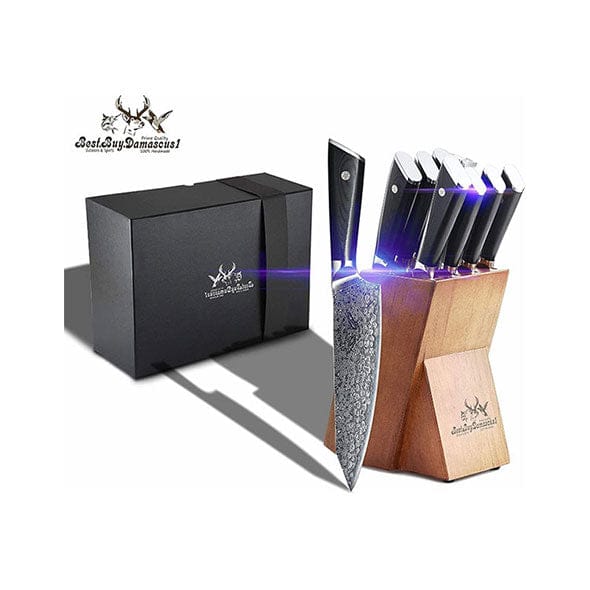
Damascus Kitchen Knife Set: How to Care for It?
Posted by Best.Buy. Damascus1 on
Every knife requires maintenance. Like any other blade, a Damascus kitchen knife set requires proper upkeep. Damascus steel knives are visually appealing and fill you with pride. Damascus steel is one of the strongest steel alloys and of superior quality. These knives are long-lasting because of this.
In this article, you’ll learn how to take care of a Damascus kitchen knife set so you can use them for years to come.
Damascus Steel: What Is It?
Damascus steel is a particular kind of steel that can be easily identified by its distinctive watery or wavy metal pattern. Due to the way the alloy looks, some claim that the name derives from Damascus, Syria, where blades were widely traded as early as 900 AD. However, others believe the name comes from the Arabic word "damas," which means "water," due to the way the alloy looks.
It is made of various metals that have been welded together to create a blade with exceptional strength and longevity. Even after all these years, the Damascus kitchen knife set continues to rank among the most sought after knives in the world.
Their unique watery or wavy texture on the steel makes them easily distinguishable. Damascus steel's exceptional quality and ability to keep an edge like no other knife are what make it so beautiful and valuable.
Some of the most exquisite knives in the world are made from Damascus steel when it is forged into a blade. They are highly valued for their sturdiness, strength, and distinctive wave-like design. Despite being around for many years, Damascus steel blades continue to be among the most popular knives today. If you're fortunate enough to own a knife made of Damascus steel, you should be sure to take the ultimate care of it.
Maintenance Tips for Damascus Kitchen Knives
A Damascus steel knife needs maintenance even though it is extremely durable. The following are instructions for caring for your Damascus kitchen knife set:
Clean the Knife
Wipe the blade clean with a soft cloth, preferably one made of microfiber or cotton, and then dry it with a fresh towel. To prevent corrosion, avoid storing your Damascus blade in water. A mild detergent can also be used, but be sure to properly rinse the blade afterward.
When cleaning a Damascus knife, stay away from abrasive items or strong chemicals like steel wool and metal cleaner because they could harm the Damascus blade's characteristic pattern.
Use Oil
It is advised to apply food-grade oil, such as mineral oil, to the entire knife after washing and drying it to prevent rust and moisture damage.
Keep in a Dry Place
Kitchen knives made of Damascus should be stored in a knife block or on a magnetic strip to keep the blades safe. The Damascus blade should be stored in a padded zipper box or case if you're putting it back into your kitchen drawer after use to prevent rusting.
Never ever put a Damascus kitchen knife in the dishwasher. The high carbon steel blades will corrode if submerged in water. Knives made of Damascus steel should only be washed by hand.
If you own a Damascus kitchen knife set and want it to last for generations, you must take special care of it. Keep appreciating its captivating look and hassle-free cutting ability for years to come.

